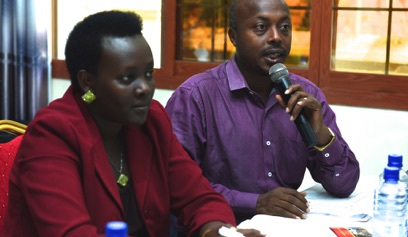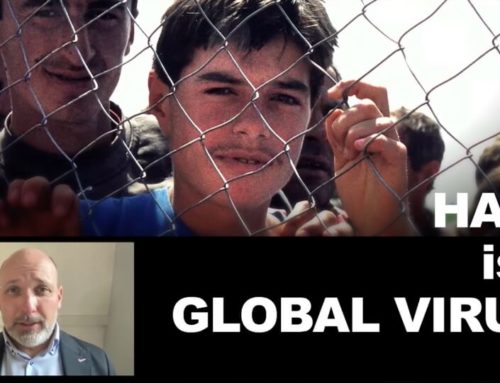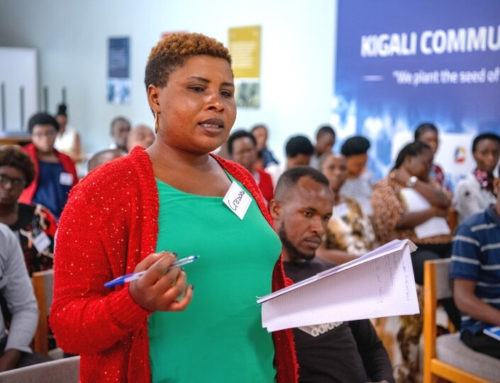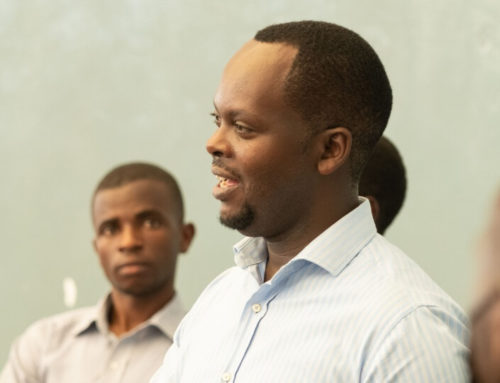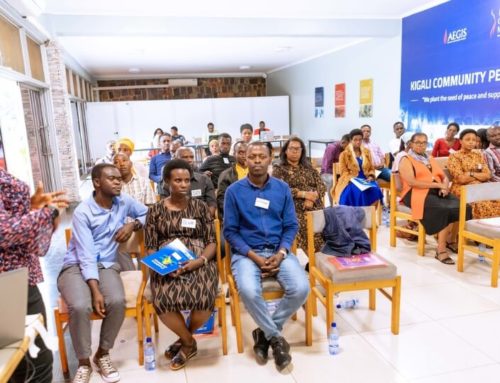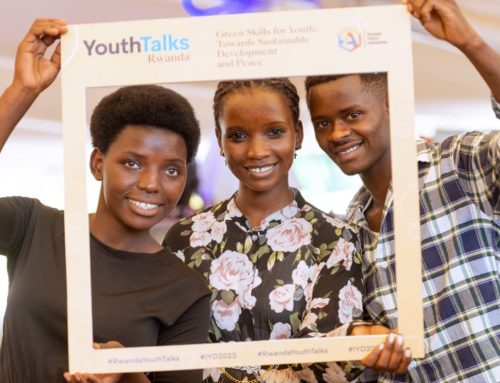The Aegis Trust has announced the selection of twelve research proposals to receive funding as part of its Research, Policy and Higher Education (RPHE) programme, supported by the UK’s Department for International Development. A selection panel comprising academics from the UK and Rwanda chose from a competitive field of 171 research proposals responding to the call for applications issued to Rwandan academics in January.
The selected innovative research proposals address seven broad themes: 1) memory, identity and narrative, 2) reconciliation and social cohesion, 3) transitional justice, 4) trauma and psychological/psycho-social issues, 5) gender dimensions of post-genocide recovery, 6) post-genocide economic development, 7) education, media and peacebuilding.
Dr Phil Clark, Head of the RPHE Programme and Reader in Comparative and International Politics at the School of Oriental and African Studies (SOAS), University of London, commented, “We are delighted with the enormous number and quality of proposals, which indicates the breadth and vibrancy of the Rwandan research community. The purpose of this programme is to support Rwandan researchers, to showcase the best of their work internationally and to enhance interactions between the academic and policy fields. The selected projects will undoubtedly do that.”
Successful candidates, who have been notified individually, will benefit from a series of workshops and a programme of peer mentoring that will take place throughout the year.
“Our community of academics working on genocide-related issues warmly welcomed the call for proposals issues by the Aegis Trust. Not only does it reinforce our capacity to produce better data and analysis on genocide-related issues in Rwanda and comparable contexts, but it also strengthens our determination to prevent mass atrocities in Rwanda and elsewhere through knowledge exchange and international collaboration”, said Alice Karekezi, Co-founder of the Center for Conflict Management at the University of Rwanda, whose research proposal on social cohesion was among those selected.
The deadline for the submission of the selected authors’ papers, with accompanying policy briefs, is 15 December 2015. The papers will eventually be submitted as articles to peer-reviewed academic journals or as chapters in edited scholarly collections. Unsuccessful candidates are encouraged to apply again during the next call for proposals.
The complete list of selected research proposals follows, together with short resumes of the authors.
Selected Proposals
Paper: ‘Youth Connect Dialogues: unwanted legacies, responsibility and nation building’
Author: Dr Richard Benda is Honorary Research Fellow at Luther King House and has a doctorate from the University of Manchester in Religions and Theology. His doctoral topic was Christian and Muslim communities in the Rwandan genocide.
Paper: ‘Gender aspects of agrarian reforms in post-genocide Rwanda: assessing land use consolidation program’
Author: Ms Fortunee Bayisenge is Dean of the Faculty of Development Studies at the Protestant Institute of Art and Social Sciences, and has a Masters degree in development studies from Erasmus University of Rotterdam. She has published on gender, community and peace themes.
Paper: ‘Teaching genocide in a post conflict society: the educational experiences of Rwandan secondary school history teachers’
Co-author: Mr Jean Léonard Buhigiro is a PhD student in the University of KwaZulu-Natal, and the former Acting Dean of the Faculty of Social Science and Business Studies at the former Kigali Institute of Education. He has published on education, gender and history of the genocide.
Co-author: Prof. Johannes Wasserman is Associate Professor of History Education at the University of KwaZulu Natal and Cluster leader for the Social Science Education cluster. He has a prolific publishing record on a wide range of topics including education, the Anglo-Boer War and other aspects of South African history.
Paper: ‘Is transcending social classifications through Gir’inka Munyarwanda a means for social cohesion?’
Co-author: Ms Alice Karekezi has been a lecturer in the University of Rwanda’s School of Law since 1996, and co-founded the Center for Conflict Management at the National University, heading the justice, human rights, and governance program. She has lectured and trained across many institutions in Rwanda and internationally.
Co-author: Dr Lonzen Rugira conducted his PhD at Howard University in the United States. His doctoral thesis investigated security and peace issues in the Great Lakes region of Africa, and he is now affiliated to the Centre for Conflict Management.
Paper: ‘Impact transgenerationnel du Genocide perpetre contre les Tutsi au Rwanda: traumatisme ou resilience? Une etude exploratoire sur les enfants des survivants’
Author: Dr Fidele Dushimimana is a Priest and Academic Vice-Rector of the Institut Catholique de Kabgayi. He completed his doctorate in psychology at Università Pontificia Salesiana in Rome, in 2010, and has published on education and social cohesion in Rwanda.
Paper: ‘Renegotiating normality in post-genocide Rwanda: the case of Orchestre Impala’
Co-author: Mr Rafiki Ubaldo is a Rwandan-Swedish journalist and photographer, and the New Media and Communication Officer for the International Association of Genocide Scholars. He has a Masters degree in Holocaust and Genocide Studies from Uppsala University, Sweden.
Co-author: Dr Helen Hintjens is Senior Lecturer in Development & Social Justice and Convenor of the MA Major in Social Justice at the International Institute of Social Studies of The University of Erasmus Rotterdam. She has published many papers on themes in social justice in the Great Lakes Region.
Paper: ‘Living under the shadow of guilt and shame: A qualitative study of the tainted lives of descendants of genocidaires in Rwanda’
Co-author: Mr Theoneste Rutayisire is a PhD candidate at the University of University of Amsterdam, due to complete in 2015, and his doctoral project is an ethnographic study on the impact of community justice in post-genocide Rwanda. He has published a number of papers on social psychology and sociotherapy in Rwanda.
Co-author: Prof. Annemiek Richters is emeritus professor of culture, health and illness at the Leiden University Medical Center and Amsterdam School for Social Science Research. She has been involved in sociotherapy in Rwanda since 2005 and is capacity building coordinator in the recently begun community-based sociotherapy program in the context of post-gacaca Rwanda.
Paper: ‘Peacebuilding input via Mentorship Program in Rwandan education: challenges faced by key stakeholders’
Co-author: Ms Anastasie Uwababyeyi has a Masters degree in Conflict Management from the Centre for Conflict Management at the University of Rwanda. Her Masters thesis was on the psycho-social consequences of divorce for spouses and children in Rwanda. She has worked as a language teacher at secondary schools and at Kigali Independent University (ULK).
Co-author: Mr Jean de Dieu Nkubito has a Masters degree in Development Studies from the University of Rwanda and a second Masters Degree in Social and Educational Research Methods from the former Kigali Institute of Education. He has conducted research on education, family planning and poverty alleviation in Rwanda.
Paper: ‘Are rural women benefiting from Rwanda’s economic growth? Analysing the Livelihoods of Female Heads Households in Rwanda (2000/1-2010/11)’
Author: Mr John Rwirahira is Senior Research Fellow at the Institute of Policy Analysis and Research (IPAR) in Rwanda, and has a Masters degree in economics from the University of Witwatersrand. At IPAR he has led many studies on a wide range of socioeconomic topics including climate-resilient development, employment, Girinka, and Historically Marginalised People.
Paper: ‘Sources of stress contributing to family conflict and violence among war and genocide affected populations in Rwanda: A qualitative study’
Author: Mr Emmanuel Sarabwe previously coordinated a community-based sociotherapy programme in the Northern Province of Rwanda. He completed a Master’s degree in social work and social administration in 2014, and his thesis topic was the contribution of community-based sociotherapy to alleviation of domestic violence.
Paper: ‘“Am I Batwa or ‘HMP’?”: Examining the issues of the ‘Historically Marginalized Peoples’ label and its implications for the Batwa of Rwanda’
Co-author: Mr Richard Ntakirutimana is the Director of the African Initiative for Mankind Progress Organization, whose mission is to promote sustainable development and respect for the human rights of HMP. He has a degree in law from Kigali Independent University (ULK) which he completed in 2014.
Co-author: Mr Bennett Collins is Research Fellow at the Centre for Global Constitutionalism at University of St Andrews in Scotland, and has published on the role of the international community in the eastern Congo. While studying for his Masters degree in African Studies at the University of Oxford, he received the African Studies prize for most innovative research.
Paper: ‘Remembering the humanity: accounting for resistance to genocide in Rwanda’
Co-author: Mr Ernest Mutwarasibo is lecturer and researcher at the College of Arts and Social Sciences at the University of Rwanda. He has written and spoken on topics including child survivors, Gacaca, the ICTR and diplomacy, and teaches at UR on topics ranging from the comparative study of 20th century genocide to the historical foundation of Asian civilisations.
Co-author: Ms Glorieuse Uwizeye is Nursing Adviser and a member of senior management for Human Resources for Health. She has over ten years of experience in nursing and mental health, and has written on the experiences of female rape survivors after the Genocide Against the Tutsi, and on the psycho-social care of youth survivors and of people suffering from HIV/AIDS.

